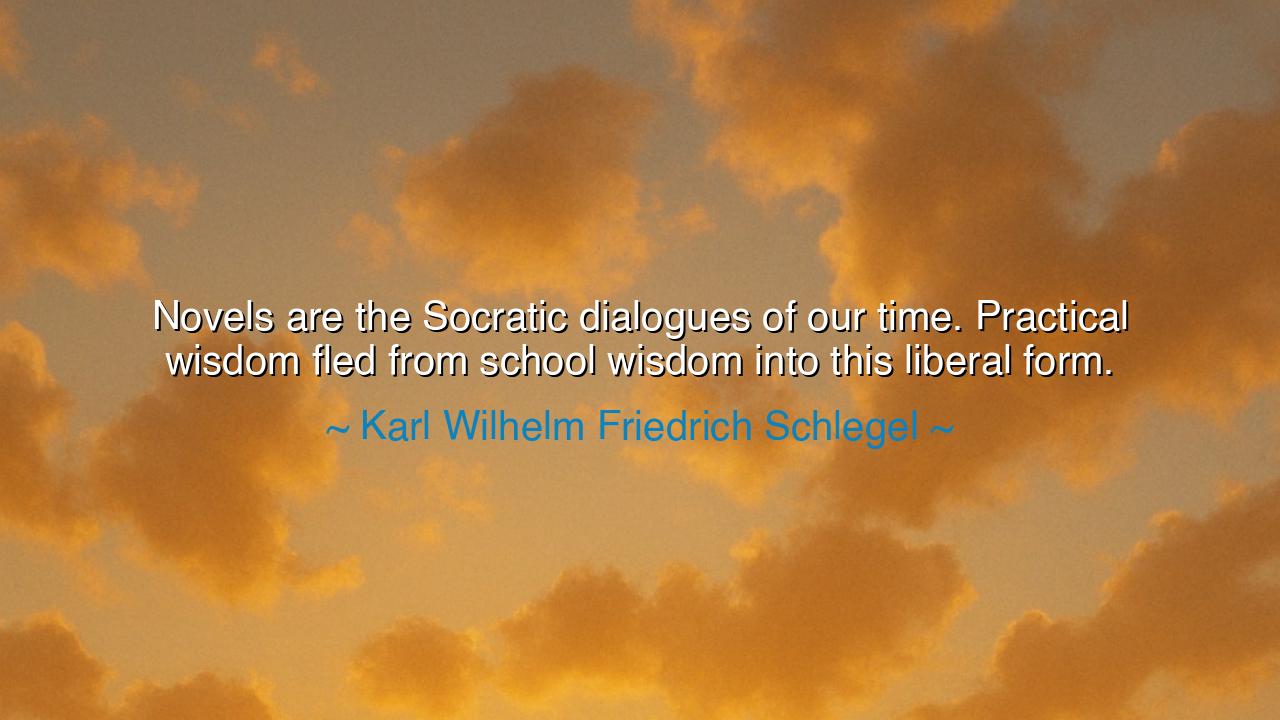
Novels are the Socratic dialogues of our time. Practical wisdom
Novels are the Socratic dialogues of our time. Practical wisdom fled from school wisdom into this liberal form.






Karl Wilhelm Friedrich Schlegel, in his vision of literature, declares that novels are the Socratic dialogues of our age. In this saying lies both reverence and lament. Once, in the marketplaces of Athens, wisdom shone through the probing questions of Socrates, who sought not to instruct but to awaken. Now, Schlegel tells us, that same flame has fled from the austere chambers of school wisdom and taken refuge in the free and wandering form of the novel. What was once spoken under the open sky now breathes in ink and paper, whispering to every reader who dares to listen.
The meaning is deep: practical wisdom, the wisdom that speaks of life as it is lived and suffered, cannot be confined within the rigid walls of scholastic order. It yearns for freedom, for the chance to question and to contradict, to mock and to weep, to exalt and to despair. Thus, it escaped from the prison of doctrine into the liberal form of storytelling, where characters may wrestle as Socrates once wrestled, and where truth emerges not by decree but by struggle.
Consider Cervantes’ Don Quixote, that knight errant of windmills and dreams. Through his madness, and through the weary pragmatism of Sancho Panza, we see a dialogue no less searching than those in Plato’s books. What is reality? What is illusion? What does it mean to live with honor, even when mocked by the world? These are questions that no school could answer in formula, but the novel brought them forth in living flesh. And so, Don Quixote stands as a modern Socratic dialogue, not in the marketplace, but in the heart of the reader.
This transformation is not weakness but strength. For the novel, unlike the formal lecture, speaks to the hidden places of the soul. It carries wisdom across the centuries disguised as tale, as fable, as laughter and sorrow. It is the wandering philosopher, clothed not in the robe of the academy, but in the garb of the storyteller. And through its disguise, it reaches the common man, the youth, the weary traveler—those whom the ancient schools never touched.
Therefore, let us honor the novel not as idle entertainment, but as the sacred vessel where wisdom hides. Schlegel’s words remind us: when the formal halls grow sterile, truth finds another home. And so long as men and women hunger for meaning, the Socratic spirit will never die—it will merely change its form. For whether spoken by Socrates in Athens, or whispered by a character in a book, the call remains the same: “Know thyself.”






TNThanh Nguyen
I see a subtle critique in this idea—that formal education lost touch with lived experience, and novels became the new vessels for understanding life. That’s a powerful thought. It makes me question what kind of wisdom schools promote today—facts, or insight? Maybe stories connect us more deeply to truth because they’re grounded in empathy and human struggle. Could this mean that emotional intelligence, not academic logic, has become the true heir to philosophical discourse?
PTPaiso Taitico
This quote makes me reflect on how art evolves to preserve human inquiry. If philosophy once belonged to scholars, perhaps novels democratized wisdom by making reflection emotional and accessible. But is it fair to say that ‘practical wisdom’ truly fled academia? Maybe the two forms complement each other—philosophy questions abstractly, while novels make those questions personal. I’d love to know what Schlegel would think of modern media—films, podcasts, even video games—as successors to the novel.
Q6Ngoc Quyen 6a1
I find this perspective fascinating because it elevates fiction beyond mere storytelling. It suggests that novels carry ethical and intellectual weight, engaging readers in thought the way philosophy once did. But I can’t help wondering—does this depend on the reader’s willingness to engage critically? Many people read for escapism, not wisdom. Can literature still guide moral or existential understanding in a world that values instant gratification over introspection?
Hhsdjjhfjs
This is such an intriguing comparison. It makes me wonder whether Schlegel viewed novels as the modern medium for philosophical exploration—the place where people question morality, society, and truth, much like Socrates once did through dialogue. Do novels still serve that role today, though? With entertainment often prioritized over reflection, has storytelling lost its connection to wisdom? Or do the best contemporary novels still provoke the same deep self-examination once sparked by philosophy?